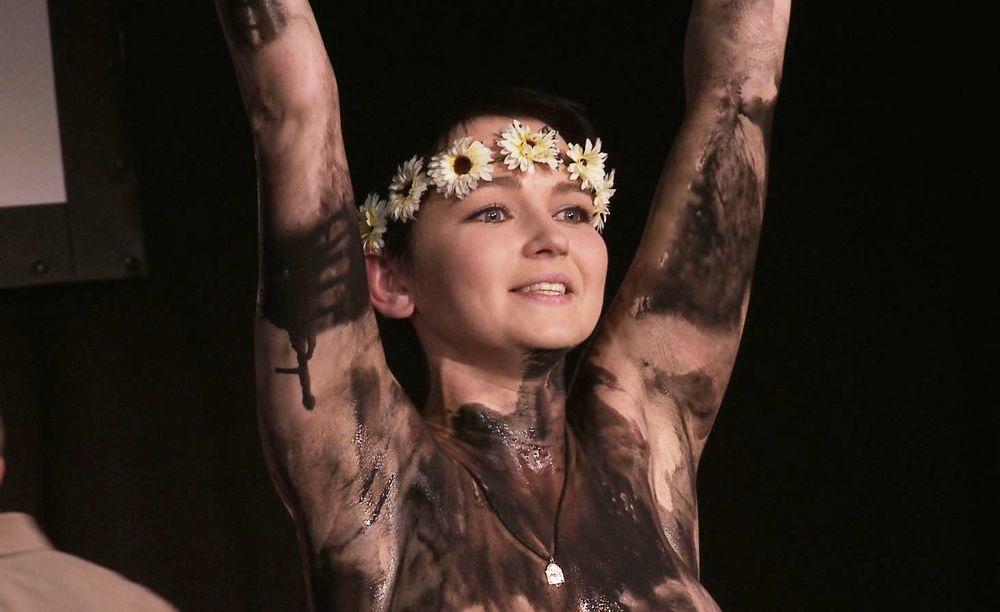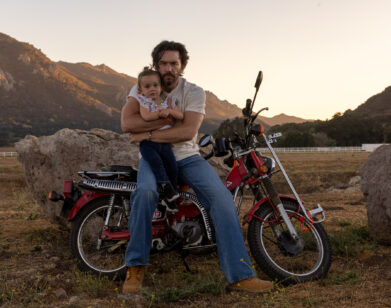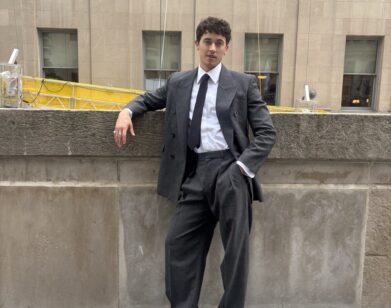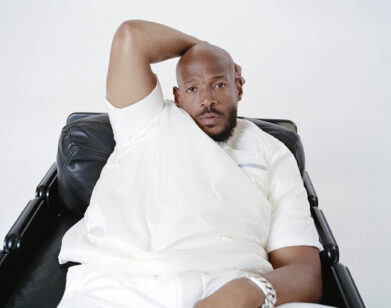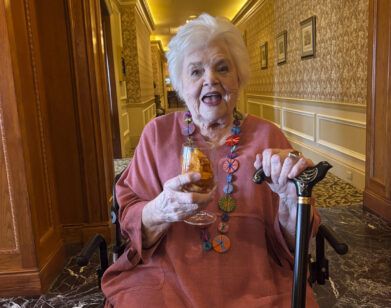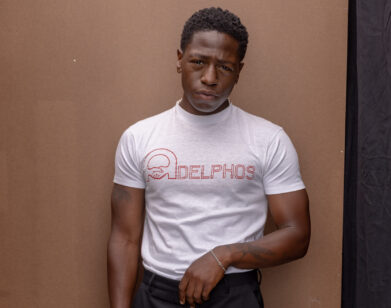Caught in the Act: Belarus’ Free Theater
In 2010, thousands of protesters took to the streets of Minsk, the capital city of Belarus, to protest the rigged presidential elections. The incumbent president-dictator, Alexander Lukashenko, reportedly received 79% of the vote, ensuring the continuation of his nearly two-decade reign. Rioters were brutally beaten back by the police. Lukashenko’s victory was an upset for the vital opposition movement spearheaded by presidential candidate Andrei Sannikov—an opposition group that also includes the charismatic members of the Belarus Free Theater. In the documentary Dangerous Acts Starring the Unstable Elements of Belarus, which premieres this Monday on HBO, director Madeleine Sackler follows members of the Free Theater over the course of 15 months, charting their successes, creative process, and personal tragedies as they work to bring theater that treats taboo subjects to the Belarusian populace.
In Belarus, the regime’s censorship runs far deeper than simple criticism of the government itself. Belarus exists as a seeming relic of a bygone Soviet era. Members of the KGB still act as political enforcers, and it is forbidden to speak of such topics as gender, sexuality, drugs, mental illness—deeply personal topics that affect each member of the Free Theater. In one particularly harrowing sequence, an actor recounts a family member’s suicide, describing the lengths to which the dictatorship will go to suppress such a story’s telling.
“The cycle that you see in the film is what has happened for the last 20 years,” Sackler says. Each election year, Lukashenko’s KGB undermines the opposition movement, deporting or imprisoning its members and forcing it to start from scratch again. During the course of Dangerous Acts, members of the Free Theater, too, are forced out of their home. They venture underground, out of sight of the regime, and perform around the world.
Through a combination of personal vision and long-distance Skype interviews—Sackler could not enter Belarus for fear of bringing unwanted attention to the underground theater—she crafts a sensitive portrait of the individual characters that help the viewer grasp the gravity of the broader political scene in Belarus. “I don’t think we would have been able to make this movie 10 years ago,” she recounts. “We really used all of the technology available to us.” Sackler worked closely with a Belarusian videographer via video chat to scope out filming locations, decide on camera angles, and speak one-on-one with subjects she couldn’t otherwise access. The footage obtained in Belarus (“We have many, many copies of the footage all over Belarus,” Sackler tells us) was then smuggled across the border to a neighboring country where the package would not be searched before it could be sent to the United States. Sackler and her team of a dozen cinematographers, producers and translators (she does not speak Russian) then assembled the film into a coherent story.
The film is Sackler’s third feature documentary, and her experienced eye is apparent throughout this latest work. Sackler is no stranger to individual portrait studies as a way of delving into serious topics—her past filmography includes The Lottery, which recounts the struggles of inner-city New York schoolchildren as they navigate the public and charter school system, and Duke 91 & 92: Back to Back, a film about her alma mater Duke’s storied men’s basketball team of 1991-1992. In the future, however, Sackler hopes to break into narrative filmmaking.
KATHERINE CUSUMANO: In the film, Belarus is referred to as being about the “last dictatorship in Europe,” which, when I first heard that, sounded like the premise for a Sacha Baron Cohen film or something.
MADELEINE SACKLER: Right, like “The Last Dictator.”
CUSUMANO: But it’s actually very real and very intense. I read that it’s the last place in the world where the KGB is still known by that acronym.
SACKLER: Yeah, the Free Theater jokes that the only thing that the dictator is honest about is that there are KGB still in Belarus. [both laugh]
CUSUMANO: So I want to start from the very beginning. What drew you to the Belarus Free Theater?
SACKLER: I met them in the summer of 2010, so it was about six months before the violent crackdown that you see in the beginning of the film. And, to be honest, I just didn’t know that much about the situation in Belarus and was very, very surprised. The more I learned about what they had to go through just to do the simple thing of making art, at first, the less I believed it. I couldn’t imagine that there was still a place in the middle of Europe in the 21st century where you can’t tell a story about a family member who commits suicide or struggling with sexual identity. You can sort of understand, in a way, censorship when it’s directly against a regime, but it’s so broad in Belarus that you can’t even talk about these deeply personal things. The fact that I knew so little made me wonder why, and I became sort of obsessed with why didn’t I know more about this, and wanting to share that story with other people.
CUSUMANO: Yeah, Belarus is not one of those countries that nobody’s heard of.
SACKLER: Right, and it’s quite big. It’s not a small country. [laughs] It’s independent and it’s about nine million people. For me, the most interesting stories are the ones that I don’t know. It makes it a much harder film to get made, because it’s not the zeitgeist.
CUSUMANO: Right. How did meeting the members of the company sort of bring you into learning about the politics of it?
SACKLER: Well, they tour quite extensively, so they’ve performed at the Public [in New York] and at the Globe [in London], a lot of the best theaters around the world, and so I had already been reading a little bit about them and about Belarus when I met them. But then I was particularly interested in the fact that their art was all non-fiction, so it’s sort of like staged documentaries. They’re telling real stories about what life is like in Belarus, but in a creative way, which is what we try to do when we’re making documentaries. I was interested in combining those two art forms: would there be a way to sort of seamlessly integrate verité documentary footage and their art? I like learning about history and about politics through real people, and that’s what we tried to do in this film, introduce you to real people and families and kids, not to an issue or a history.
CUSUMANO: There are some very incredible shots of the actual performances interspersed throughout the story, and I thought the first scene is particularly jarring. The actor—and I don’t want to give too much away because it kind of unfolds, but he ends up being exiled—shouts to the audience, “Belarus is not sexy.” Sex, and sexuality, is a repeated motif throughout the film. How did you select that shot as the audience’s introduction to the theater company?
SACKLER: A lot of times in documentaries, you end up cutting the first scene last. We really struggled with how to open this film. I think we had 10 different first scenes. [laughs] It felt like a way to combine their art seamlessly with raw documentary footage. We cut back and forth between their violent, dramatic rendition of a protest and a violent crackdown with teaser footage from what’s about to happen in the country after a rigged election. I wanted to open the film with something artistic but also something that would hopefully make you sit up and wonder what is it that’s happening in this country.
CUSUMANO: How long did it take to cultivate the story that you wanted and capture all of the elements across different continents?
SACKLER: This was a really hard one because so many things were happening that we didn’t know. Once they fled the country, we had absolutely no idea if they would ever be able to go back, and if so, who, and if so, when. Then there’s the question of when do you stop? We weren’t going to wait for Lukashenko to fall, although that is sort of a romantic idea. But given that we didn’t have the resources to do that, when do you stop filming, and how do you know where to end the story? We had about 500 hours of footage, so I think we could have made a lot of different movies out of that.
CUSUMANO: How has the film impacted the lives of the theater members who actually remain in Belarus? Has there been any risk to them since it’s come out?
SACKLER: Not yet. We’ve just been doing our festival run, and in a way—it’s sort of an apparent contradiction—the more exposure you have, the safer you are because the government has to extend that much more political capital. That said, there’s definitely a line that you can cross. Andrei Sannikov, the presidential candidate in the film, one of the core members of his campaign team was found hung a couple weeks before the election as a staged suicide. And people disappear and people are arrested for no reason, so it’s one of those sort of terrifying things where there’s a gray area and you kind of get used to it and you sort of know how to navigate it but you don’t really know always where the gray areas can start and stop. Our hope, and the reason everybody participated in the film, is the more attention we can draw to it, and the more people who care about it, the safer it will become.
CUSUMANO: That makes sense.
SACKLER: I hope so! We haven’t screened the film yet in Belarus. We hope to in the next few weeks—not in any big, public way, but just to start showing it there and seeing what the reactions are like, because the next election is already coming up next year. At that time, we’re hoping to do more screenings and trying to provide support however we can.
CUSUMANO: And Sannikov was released last year?
SACKLER: He’ll probably never be able to go back, so he’s now in Warsaw, and has come to a lot of our screenings and he’s working on spreading the word about Belarus and working towards freedom in Belarus with his campaign team in Warsaw. There were really three main opposition candidates, and I believe that all of them are now in exile.
CUSUMANO: You mentioned that you and Oleg, one of the subjects of the documentary, wrote a new performance piece together—had you done any theater writing before?
SACKLER: [laughs] Not since high school. He didn’t want to write it himself, but I wanted it to be in his words, so it’s actually based on conversations that we had over Skype. We spoke for a long time, and I actually used, in most cases, verbatim things that he said and edited it into a 20-minute monologue. He’s a really, really great actor, so the more we can put him on the stage instead of me, the better.
CUSUMANO: And it will go great with the film.
SACKLER: Yeah. The play starts where the film leaves off, and tracks back in time to his birth, kind of juxtaposing the history of Belarus and Oleg’s own story to try to understand a little bit more why things are the way they are now.
CUSUMANO: So is it a one-man show?
SACKLER: Yeah, it’s all Oleg.
CUSUMANO: The film premiered at the Toronto Film Festival, correct? How did you find out that it had gotten in?
SACKLER: Thom Powers called. That was definitely the most exciting day of things that have happened for this film. At that point, we had been working on it for almost four years, and so it was really exciting to hear that we were going to be able to show it there.
CUSUMANO: Your last movie, The Lottery, also had a pretty political bent. But you described yourself in the Wall Street Journal as “not a political person.” What keeps bringing you around to these really heavy, intense political subjects?
SACKLER: [laughs] It’s always good when you get quoted to yourself. I actually made a film in between, a basketball film. I guess it’s true, two out of the three films have technically involved some politics, but I wouldn’t actually even describe the films as political. The Lottery is about the dreams of four kids, and it’s very focused on that. It just feels political because the story of the kids’ dreams is that they can’t achieve them.
CUSUMANO: Right. But it’s got a very political backdrop.
SACKLER: But that’s not politics, that’s who the kids are. And the Dangerous Acts film is about people trying to make theater and being stopped. So for me, the stories are much more about people and their dreams and the fact that they’re doing whatever it takes to achieve them, so it’s much more hopeful than negative. I’m really more excited about telling stories than I am about politics, so the upcoming films may or may not be political at all.
DANGEROUS ACTS STARRING THE UNSTABLE ELEMENTS OF BELARUS PREMIERES MONDAY, JULY 7, ON HBO.

